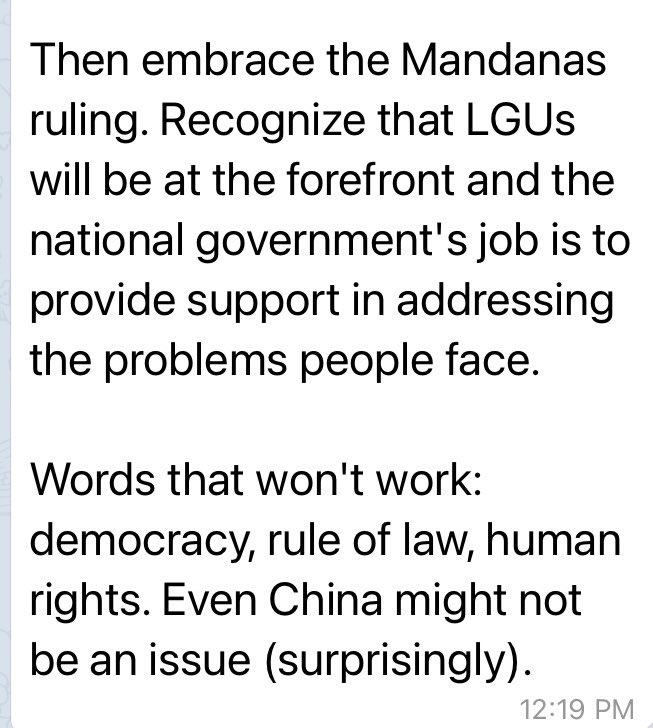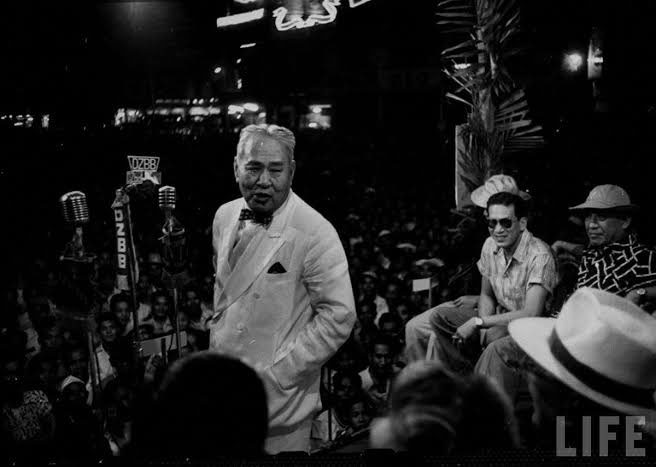
I thought I'd explain the context for groups like the one launched today, 1Sambayan, because as an attempt to unify opposition to an administration that's intimidating, it is part of a history of similar efforts. S, to give context, this thread...
https://twitter.com/rapplerdotcom/status/1372377182811648002
Here is a photo from May, 1941, when the country was essentially a one-party state under the Nacionalista Party. From 1935 to before martial law, political parties selected candidates by means of party conventions. Candidates were expected to rise through the ranks. 

By the postwar years when by accident (the prewar monolithic NP was split over the Collaboration issue) rather than design, party conventions could at times be quite competitive. A flavor of the era is captured by this account of the NP Convention of 1953: philippinesfreepress.wordpress.com/1953/04/18/the…
Candidates at the top could switch but there remained cadres of loyal party people up and down the line, and also, a geographic bailiwick to party organization (some provinces tended to vote LP, other NP, for example). Then Martial Law happened...
Martial Law revived many schemes from the Japanese Occupation. One of them was replacing all political parties with a "national movement" called KALIBAPI. Marcos copied it by creating the KBL --a kilusan, not a lapian-- to replace and displace parties and their networks... 



Why this was the scheme is best told by an admirer of Marcos who repeats a story widely-told at the time. It was former Speaker Laurel who'd been a political aide of his father during the Occupation, who put forward the Kalibapi model for the KBL: chrisbonoan.blogspot.com/2014/03/dear-n… 

The point of this is to underscore how the premartial law parties were dismantled, their networks dissolved, their reason for being --moving up the ranks-- eliminated. When opposition to Marcos broadened to include the middle class and moderates, it faced a fundamental problem...
If Marcos was strong, if the country was a one-party state, how could anyone else claim to speak for "the people" and how could so many different groups, many of which were no fans of the old parties, get together to put forward candidates with credibility and national standing?
The solution is something I recounted in my longform article on the period 1972-1986, when the dictatorship came to face the forces that eventually toppled it. The solution was something called The Convenors Group. mlq3.tumblr.com/post/341501309… 





Since political parties had become shadows of their former selves, credible people from different sectors came together to conduct consultations and arrive at a consensus --many of the functions old parties did for themselves but this time, on a wider scale...
After Marcos fell and democracy was restored, the old parties were resurrected but shadows of their former selves; at the same time, civic groups found it difficult to reconcile the patronage and dealmaking parties do, with their conceptions of democracy. philippinesfreepress.wordpress.com/1987/01/10/cor…
Again, when democracy-as-usual reached a crisis in the Estrada era, a return to the Snap Election era consensus-building was attempted; another kind of convenors' group, which came to be known as Kompil 2. pssc.org.ph/wp-content/pss…
And so in the end that is the genesis of the group making its debut today. Political parties are well, too partisan, and dysfunctional, to come up with a system for candidates to rise up within their own ranks; so marrying groups with civil society is being tried again.
People are weighing in on how applicable the model still is. .@lelanddelacruz has some thought-provoking opinions.... 





I myself reflected on this based on .@jnery_newsstand’s own reflections...
https://twitter.com/mlq3/status/1364388006954631170
Let’s how the public reacts —if it does.
Three things we have to mull over. The first is, how best to reach the public --in an era when The Public of old is getting sliced and diced because of technology into many public(s); where even the political pros find it increasingly hard to compete because of expense; and...
where the conventional wisdom can increasingly no longer be challenged because feedback for finding out the public pulse --surveys-- is increasingly questioned as potentially irrevocably flawed; but then who has the data that can matter to find out what public really cares about?
And the collapse of the very foundational assumptions of political exercises like coalition-building with a goal to reform: it is based on a civic sense and consciousness that is increasingly rare, no longer widely shared if it even exists, and even if shared, rendered mute.
I've written often enough how this is most revealed at the so-called grassroots where the electorate is so mercenary political clans have to bury the hatchet and divide offices among themselves as they can't afford the expenses of competition considering even an unchallenged...
candidacy requires buying off the electorate. The erosion of media's clout because mass media has shrunk to basically TV and even that is challenged by the internet --making even advertising a losing proposition on free TV-- means both shaping and identifying public opinion...
is less a question of courting public opinion and instead, manufacturing a semblance of it to trigger pavlovian reflexes in the electorate --and even there, merely in order to achieve plurality necessary for victory.
To me we first have to realize that *everyone* will market themselves as an oppositionist somehow because nothing is less enticing to our mindset than continuity, besides which groups need to reassemble a winning coalition. The second thing we have to bear in mind is that...
the rules of the game determine how it's played. Some of my favorite examples: when we abolished bloc voting for the senate, it precisely created the conditions the creators of a nationally-elected senate feared, the undue advantage of fame and money. Removing bloc voting also...
meant that those with fame but no money had to do things like be "guest candidates" to survive, weakening parties. On parties, my other example is how we made barangays "non-political," which meant we would never have grassroots parties again because the grassroots were divorced
politically from other positions, so no incentive to stay in a group and climb up its ranks or stay in a group, period. The other rule we have is it's winner-take-all but a multparty system: so, we forget elections are not won by convincing a majority of the people. They...
haven't been conducted that way since 1986. Elections are about convincing the most number of the biggest minority and not the creation of an actual majority. So from the start it isn't a matter of convincing the majority but cultivating a bigger minority than all the others...
This means our intrinsic balimbing mentality is aided, not harmed, by the rules. Everyone just has to wait to see the winner and presto, everyone jumps on board --and everyone can somehow say it's democratic. So these limitations actually undermine our basic assumptions about...
national elections and positions. We are continuing with pre-1986 assumptions of how they are made and on what they are built, refusing to see how this has not been the case since 1986 which is why its all become increasingly dysfunctional.
Finally, coming full circle, there is a larger crisis: the Crisis of Modernity; more on that in the link, but also see the end part: social classes aren't isolated; individuals across classes share things in common. That is the key to succesful adaptation. quezon.ph/2015/12/18/the…
For those curious about it, follow .@1Sambayan to learn more about it and its methods and activities.
• • •
Missing some Tweet in this thread? You can try to
force a refresh











